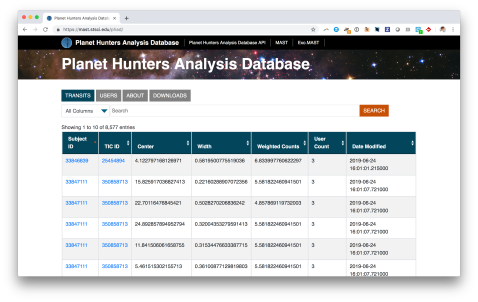Planet Hunters: TESS results now on MAST
Since Planet Hunters launched in 2010, we’ve made all sorts of interesting discoveries, but apart from the occasional blog posted here you’ve had to wait until we’ve written them up in peer reviewed papers to hear about them. Such formal publication is important – it’s how information gets written into the scientific record, and how credit is recorded – but it’s slow, and this can be frustrating. It’s especially frustrating for volunteers who think they’ve found something and who then have to wait years for us to get around to doing the work required to turn a ‘maybe’ into a candidate worth publishing.
For TESS, we wanted to do something a bit different. Once candidates have been vetted they can be posted to exoFOP, where the astronomical community coordinates follow-up, but it takes quite a lot of work to get to that point.
We want to share your discoveries as quickly as possible, so today we’ve switched on a system that analyses your classifications as they come in, and when a potential planet is detected passes this information immediately to the archive which hosts TESS data, MAST. (MAST is run by a team at the Space Telescope Science Institute in Baltimore, including original Zooniverse technical lead Arfon Smith).
This means that anyone can access the latest Planet Hunters data via the Planet Hunters Analysis Database – and from there go on to explore the rest of the data that might exist about the host stars and system. Volunteers get to see their results almost instantly (and get their name in an official NASA archive!), and scientists will be able to use this data to identify possible planets that they can follow up, and give credit to the citizen scientists when they do – so hopefully this new strategy will result in more Planet Hunters planets making it into the literature.
We can run Planet Hunters because the TESS team are being open with their data. We hope that being equally open with our data will encourage more people to get involved so we can find even more planets. Go see if your name is already up in lights at https://mast.stsci.edu/phad/, or get classifying to contribute to the results at www.planethunters.org!
PS The MAST team provide a set of Jupyter notebooks which support TESS data analysis. If you know a little Python, or are willing to learn, then you can get quite a long way analysing your own candidates! Get started at https://github.com/zooniverse/phad-notebook.

